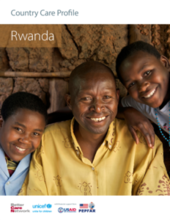The Better Care Network (BCN) and UNICEF, supported by the President’s Emergency Plan for AIDS Relief (PEPFAR)/ US Agency for International Development (USAID), commissioned Maestral International LLC to document significant child-care reform work being carried out at country level in three African countries, to promote information exchange and learning within the region, and reinforce and encourage care reform in other countries. These reforms involve legislation, policies and programmes, including service delivery, advocacy and networking. The three countries reviewed for the country profile study were: Ghana, Liberia and Rwanda.
The country profiles document efforts to support care reform within these countries. Based within a framework reflective of the ‘Guidelines for the Alternative Care of Children’, the profiles provide an overview and analysis of key areas in alternative care services provision and reform efforts. The key areas are:
-
National enactment and implementation of the legal and policy framework;
-
Preventive and family support services;
-
Availability and range of family-based alternative care services;
-
Residential care and deinstitutionalization efforts;
-
Supporting children exiting or leaving alternative care arrangements;
-
Domestic and inter-country adoption;
-
Information management systems; and
-
Social welfare workforce
The profiles provide an overview of key lessons learned, including successes, challenges and areas for progress, and gaps in learning and best practice. The goal of the country profiles is to inform the strengthening of care-reform efforts in the sub-Saharan Africa region. It is envisaged that they will build on the positive momentum generated by recent regional conferences, child protection systems strengthening initiatives, deinstitutionalization efforts, and country-level child protection and care networks. The profiles can contribute to the exchange of information between and among countries on successes and challenges in implementing care-reform efforts, facilitate the development of a community of practice in Africa, and harness reform and political will among donor, government and non-governmental actors. Ultimately, these care profiles can increase collaboration between national and regional actors who are supportive of care reform, strengthening child-protection systems and promoting family-based care options for children.
View the collection of Country Care Profiles here.

